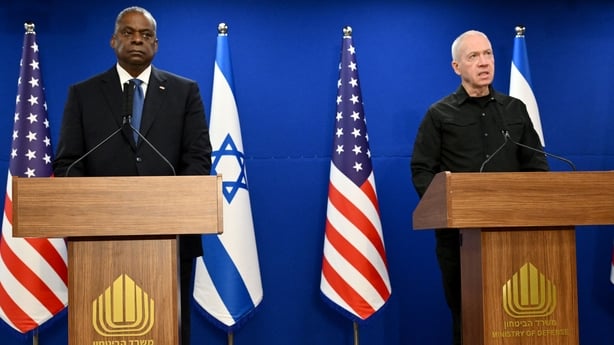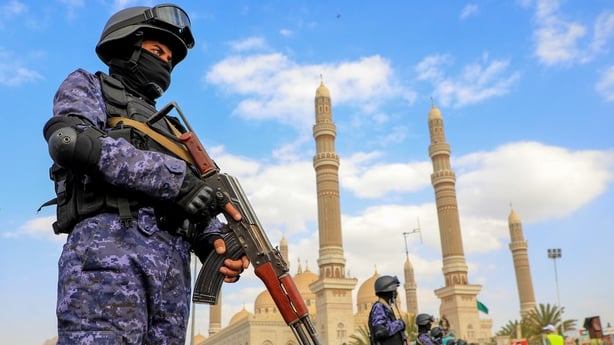The US has announced the creation of a multinational operation to safeguard commerce in the Red Sea following a series of missile and drone attacks by Yemen's Iran-aligned Houthis.
US Defense Secretary Lloyd Austin, who is on a trip to Bahrain, home to the US Navy's headquarters in the Middle East, said participating countries include the United Kingdom, Bahrain, Canada, France, Italy, Netherlands, Norway, Seychelles and Spain.
The group will conduct joint patrols in the southern Red Sea and the Gulf of Aden.
"This is an international challenge that demands collective action. Therefore today I am announcing the establishment of Operation Prosperity Guardian, an important new multinational security initiative," Mr Austin said in a statement.

In a virtual meeting with ministers from more than 40 nations, Mr Austin called on other countries to contribute as he condemned "reckless Houthi actions."
"We're all here because many countries can directly contribute to our common efforts to keep strategic waterways safe," he said, according to prepared remarks.
Still, the announcement leaves many questions unanswered, including whether any additional countries are willing to do what mostly US warships have done in recent days - shoot down Houthi missiles and drones, and rush to the aid of commercial ships under attack.
The US Navy already had a Red Sea task force that had bolstered its presence in the critical waterway, and it is unclear how many countries will send additional ships or patrol aircraft following the creation of Operation Prosperity Guardian.
The Houthis have waded into the Israel-Hamas conflict by attacking vessels in vital shipping lanes and even firing drones and missiles at Israel more than 1,000km from their seat of power in the Yemeni capital of Sanaa.
Before Mr Austin's announcement, the Houthi group said it launched a drone attack yesterday on two cargo vessels in the region.
British maritime security firm Ambrey said this morning that it received information of a potential boarding attempt 17 miles west of Yemen's Aden port city, adding that the attack was unsuccessful and all crew were safe.
The Houthis have threatened to target all ships heading to Israel, regardless of their nationality, and warned international shipping companies against dealing with Israeli ports.

About 12% of world shipping traffic normally transits via the Suez Canal, the shortest shipping route between Europe and Asia, passing then as well into the Red Sea waters off Yemen.
But the unrest has disrupted maritime trade, as freight firms reroute around Africa instead, adding costs and delays which are expected to be compounded over coming weeks.
Combined, the companies that have diverted vessels "control around half of the global container shipping market," ABN Amro analyst Albert Jan Swart told Reuters.
Oil major BP temporarily paused all transits through the Red Sea and oil tanker group Frontline said its vessels would avoid passage through the waterway, signs the crisis was broadening to include energy shipments. Crude oil prices rose on those concerns yesterday.
During a visit to Israel yesterday, Mr Austin squarely blamed Iran for the Houthi attacks.
"Iran's support for Houthi attacks on commercial vessels must stop," he said.
At a news conference in Tel Aviv, Mr Austin said: "As we are driving to stabilise the region, Iran is raising tensions by continuing to support terrorist groups and militias."
Read more: Who are the Houthis? The Yemen group threatening ships in the Red Sea
The Houthis said they would not halt attacks on Red Sea shipping.
"Even if America succeeds in mobilising the entire world, our military operations will not stop... no matter the sacrifices it costs us," senior Huthi official Mohammed al-Bukhaiti said on X.
Rebel spokesman Mohammed Abdul Salam said the "US-formed coalition aims to protect Israel and militarise the sea," adding that "whoever seeks to expand the conflict must bear the consequences of those actions."
According to analysts, the maritime task force announced by Washington can do little to halt attacks by Houthi rebels, who command an arsenal of ballistic missiles, cruise missiles and drones.
"The Houthis have an extended arsenal of different drones and missiles that they can shoot... and some of them will be difficult to intercept by your average navy ship," Andreas Krieg, a professor at King's College London, told AFP.
Torbjorn Soltvedt of the risk intelligence firm Verisk Maplecroft said the "threat to shipping is also further increased by the group's ability to deploy anti-ship mines and execute coordinated operations using boats and helicopters."

